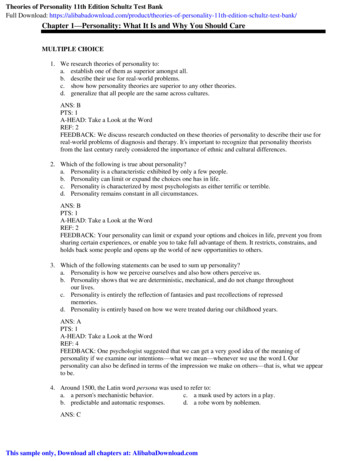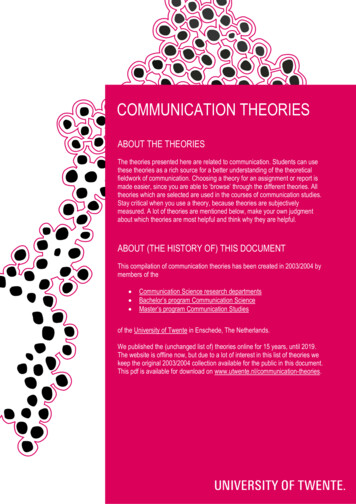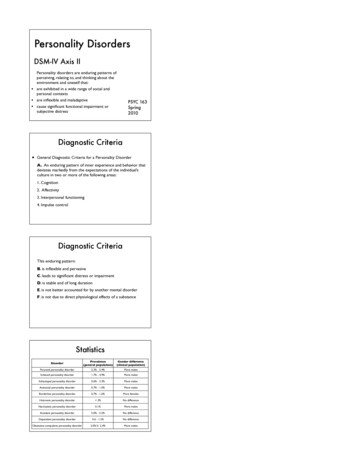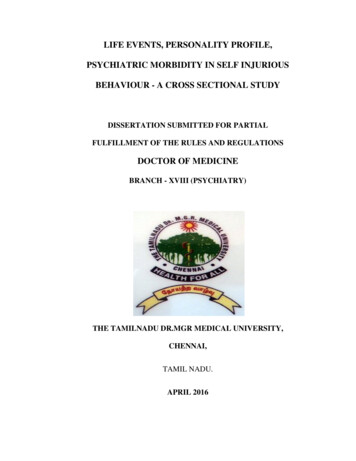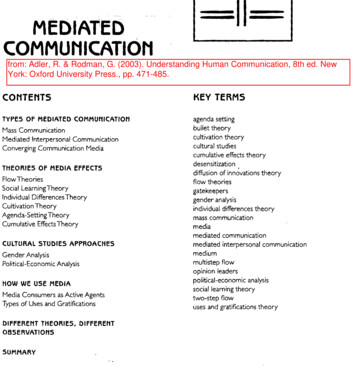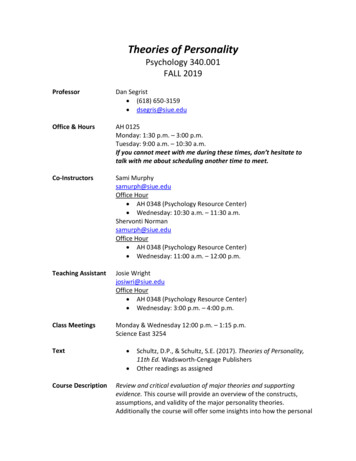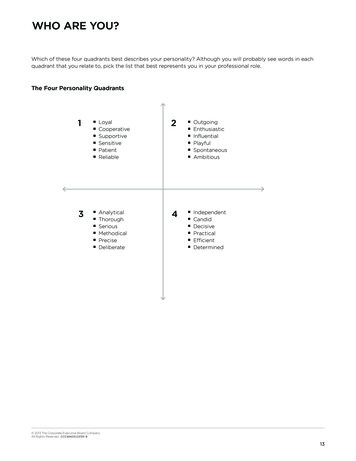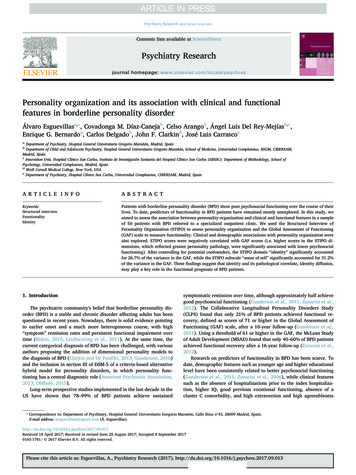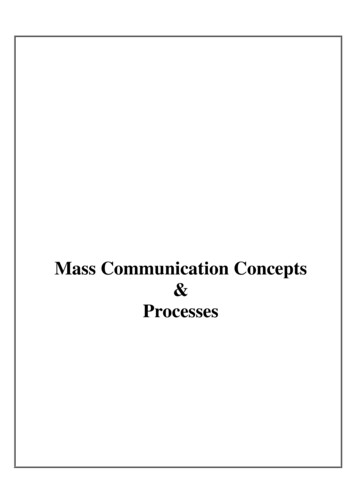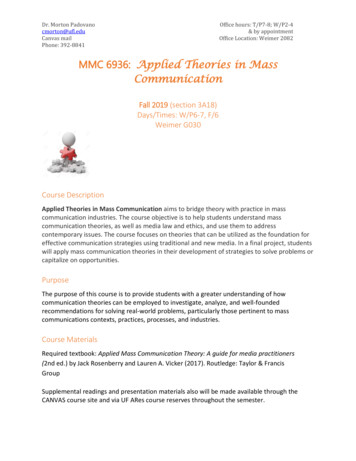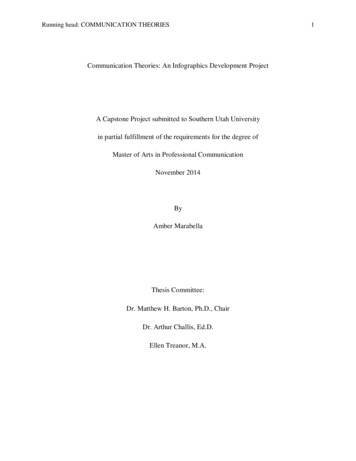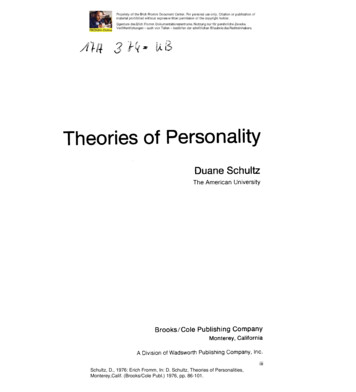
Transcription
Propriety of the Erich Fromm Document Center. For personal use only. Citation or publication ofmaterial prohibited without express written permission of the copyright holder.Eigentum des Erich Fromm Dokumentationszentrums. Nutzung nur für persönliche Zwecke.Veröffentlichungen – auch von Teilen – bedürfen der schriftlichen Erlaubnis des Rechteinhabers.Theories of PersonalityDuane SchultzThe American UniversityBrooks/Cole Publishing CompanyMonterey, CaliforniaA Division of Wadsworth Publishing Company, Inc.iiiSchultz, D., 1976: Erich Fromm, In: D. Schultz, Theories of Personalities,Monterey,Calif. (Brooks/Cole Publ.) 1976, pp. 86-101.
Propriety of the Erich Fromm Document Center. For personal use only. Citation or publication ofmaterial prohibited without express written permission of the copyright holder.Eigentum des Erich Fromm Dokumentationszentrums. Nutzung nur für persönliche Zwecke.Veröffentlichungen – auch von Teilen – bedürfen der schriftlichen Erlaubnis des Rechteinhabers.Erich FrommSchultz, D., 1976: Erich Fromm, In: D. Schultz, Theories of Personalities,Monterey,Calif. (Brooks/Cole Publ.) 1976, pp. 86-101.85
Propriety of the Erich Fromm Document Center. For personal use only. Citation or publication ofmaterial prohibited without express written permission of the copyright holder.Eigentum des Erich Fromm Dokumentationszentrums. Nutzung nur für persönliche Zwecke.Veröffentlichungen – auch von Teilen – bedürfen der schriftlichen Erlaubnis des Rechteinhabers.The most beautiful as well as the most uglyinclinations of man are not part of a fixed andbiologically given human nature, but result fromthe social processes which create man.—Erich FrommWith Erich Fromm we meet a theorist who, along with Adler andHorney, is often referred to as a social-psychological theorist. As theopening quote indicates, Fromm shares with the aforementioned theoristsa basic disagreement with Freud. Humanity, Fromm argues, is not inexorably driven or inevitably shaped by biological forces of an instinctivenature. Fromm also takes issue with Freud on the matter of sex; Frommdoes not view it as a primary shaping force in either normal or neuroticbehavior. Instead, Fromm sees our personality as influenced by socialand cultural forces-both those that affect an individual within a cultureand those universal forces that have influenced humanity throughout86Schultz, D., 1976: Erich Fromm, In: D. Schultz, Theories of Personalities,Monterey,Calif. (Brooks/Cole Publ.) 1976, pp. 86-101.
Propriety of the Erich Fromm Document Center. For personal use only. Citation or publication ofmaterial prohibited without express written permission of the copyright holder.Eigentum des Erich Fromm Dokumentationszentrums. Nutzung nur für persönliche Zwecke.Veröffentlichungen – auch von Teilen – bedürfen der schriftlichen Erlaubnis des Rechteinhabers.Erich Fromm87history. Thus, his stress on the social determinants of personality isbroader than that of Adler or Homey. His goal is to develop "a theoryof the various human passions as resulting from the conditions of theexistence of man." Believing that an individual creates his or her ownnature, Fromm feels that we must examine the history of mankind inorder to understand that creation.Note that Fromm says that people create their own natures. He rejectsthe notion that we are passively shaped by social forces, arguing thatwe shape the social forces ourselves. These forces act, in turn, to influencethe personality.We might say that Fromm takes a longer view of the developmentof the individual personality than other theorists do because of his concernwith the history of mankind as well as the history of the individual.Because of our history, Fromm argues, modern people suffer from feelingsof loneliness, isolation, and insignificance. Our basic needs, therefore,are to escape these feelings of isolation, to develop a sense of belonging,and to find meaning in life. Paradoxically, the increased freedom thatmankind has achieved over the centuries—both from nature and fromrigid social systems—has led to more intense feelings of loneliness andisolation. Too much freedom becomes a negative condition from whichwe attempt to flee.Fromm believes that the kinds of conflicts that people suffer arisefrom the kind of society they have constructed. However, we are notirrevocably doomed to suffering. Quite the contrary is true; Fromm remains optimistic about our ability to solve our problems—problems thatwe ourselves have created.While Fromm is a psychoanalyst (the first in our coverage withouta medical degree), he is also a philosopher, a historian, and an anthropologist. He draws on data from many sources beyond the analyticalcouch, which makes it difficult to classify him neatly as a member ofany single discipline.The Life of Fromm (1900-)Fromm was born in Frankfurt, Germany, of a family deeply steepedin Orthodox Judaism. His father was a businessman, but his grandfatherwas a rabbi and his mother's uncle a well-known Talmudic scholar. Asa child, Fromm was a devoted student of the Old Testament, the moralfervor of which influenced him greatly in his youth. Like Freud, the youngFromm was infused with the Jewish tradition of reason and intellectualactivity and experienced the emotional impact of being a member ofSchultz, D., 1976: Erich Fromm, In: D. Schultz, Theories of Personalities,Monterey,Calif. (Brooks/Cole Publ.) 1976, pp. 86-101.
Propriety of the Erich Fromm Document Center. For personal use only. Citation or publication ofmaterial prohibited without express written permission of the copyright holder.Eigentum des Erich Fromm Dokumentationszentrums. Nutzung nur für persönliche Zwecke.Veröffentlichungen – auch von Teilen – bedürfen der schriftlichen Erlaubnis des Rechteinhabers.88Chapter 5a minority group. In later life, Fromm severed all connection with organized religion and became what he described as an "atheistic mystic,"but there is no denying the influence of his early religious experiences.Little has been written about Fromm's early childhood. He was anonly child (which should give pause to those of you who are enamoredof Adler's theory), and his early home life was described as tense. Herecalls that his father was given to moodiness and was highly anxiousand that his mother was prone to bouts of depression.If we are searching for experiences and events that could have presaged his adult view of mankind, perhaps we should begin at a laterage with Fromm. For example, when he was 12, he was greatly upsetby the suicide of a family friend, a talented and beautiful woman. Inhis adolescent years, he was confused and shocked by several such tragedies, both individual and societal, and particularly by the horrors ofWorld War I (which began when he was 14). It was not only the deathsof millions (including friends and relatives) on the battlefields of Europethat disturbed him but also the atmosphere of hate, hysteria, and fanaticism that pervaded Germany.Fromm's growing interest in political theory was reinforced by thechaotic social conditions in Germany following the war and, later, bythe rise of Nazism. He became a socialist in attitude (although he neverjoined the party) and studied widely in the social sciences at Heidelberg.He became quite knowledgeable in the works of Karl Marx, Max Weber,Herbert Spencer, and other leading economic, social and politicaltheorists.Seeking the answer to the riddle of human motivation, Fromm underwent psychoanalytic training in Munich and at the PsychoanalyticInstitute in Berlin, where he was trained along orthodox Freudian lines.Still troubled by the suicide in his childhood, he felt that Freud's view"seemed to be the answer to a puzzling and frightening experience."This answer, however, did not satisfy him for very long. In the 1930s,he began to write articles that were critical of Freud—particularly ofFreud's refusal to admit the impact of socioeconomic forces on personality. In 1934, he emigrated to the United States to escape the Nazi menaceand became associated with Karen Horney and Harry Stack Sullivan.Fromm's theory has been presented—and, at this writing, is stillbeing presented—in a number of books offered in a popular style, morefor the public than for colleagues. Some of these books have been extremely popular, reaching best-seller status. Fromm has lectured at severaluniversities in the United States during his career and since 1951 hasmade his home in Mexico City. He is a professor at the University ofMexico and is director of the Mexican Psychoanalytic Institute.Schultz, D., 1976: Erich Fromm, In: D. Schultz, Theories of Personalities,Monterey,Calif. (Brooks/Cole Publ.) 1976, pp. 86-101.
Propriety of the Erich Fromm Document Center. For personal use only. Citation or publication ofmaterial prohibited without express written permission of the copyright holder.Eigentum des Erich Fromm Dokumentationszentrums. Nutzung nur für persönliche Zwecke.Veröffentlichungen – auch von Teilen – bedürfen der schriftlichen Erlaubnis des Rechteinhabers.Erich Fromm89Mankind's Basic Condition: Loneliness and InsignificanceThe title of Fromm's first book, Escape from Freedom, provides us withan indication of his vision of the basic human condition. In the historyof Western civilization, Fromm believes, as people have gained morefreedom, they have come to feel more lonely, insignificant, and alienatedfrom one another. Conversely, the less freedom people have had, thegreater have been their feelings of belongingness and security. Thus,freedom would seem to be antithetical to our needs for security andidentification. It is Fromm's contention that modern people, possessinggreater freedom than has been offered in any other era, feel more lonely,alienated, and insignificant than people of ages past.To fully understand what Fromm means by this apparent paradox,we must examine briefly the history of Western civilization, as Fromminterprets it. He begins by discussing our evolution from the lower animals and noting the basic distinction between animal nature and humannature: people are free ofthe instinctive biological mechanisms that guidethe animal's every move. The lower an animal is on the phylogeneticscale, the more firmly fixed the pattern and form of its behavior. Thehigher the animal, the more flexible its behaviors. Human beings, asthe highest animals, have the greatest flexibility of all. Our actions arethe least tied to instinctive mechanisms.But there is more to us than greater flexibility of behavior. We know;we are conscious and aware of ourselves and the world around us.Through learning, we accumulate a knowledge of the past. Through imagination we can go far beyond the present. Because we know, becausewe master nature, we are no longer at one with nature, as are the loweranimals. As Fromm put it, we have transcended nature. As a result, whilestill a part of nature, in that we are subject to its physical laws (andcan't change them), we are separate from nature—homeless, as it were.Unlike the other animals, we realize how powerless we are ultimately; we know that we will die. And we know how different we are fromthe other animals. Looked at in one way, this knowledge of being separateand apart from the rest of nature is a kind of freedom. Our mind givesus infinite choice. But looked at in another way, this separateness spellsalienation from the rest of nature. Human beings cannot revert to animalstatus; we cannot free ourselves of knowledge, of the mind. What, then,can we do? How can we escape the feelings of isolation and apartness?Fromm said that early peoples tried to escape their state of alienationfrom nature by identifying fully with their tribes or clans. Sharing myths,religions, and tribal rites and customs, they obtained the security of belonging to a group. Membership in the group provided acceptance,Schultz, D., 1976: Erich Fromm, In: D. Schultz, Theories of Personalities,Monterey,Calif. (Brooks/Cole Publ.) 1976, pp. 86-101.
Propriety of the Erich Fromm Document Center. For personal use only. Citation or publication ofmaterial prohibited without express written permission of the copyright holder.Eigentum des Erich Fromm Dokumentationszentrums. Nutzung nur für persönliche Zwecke.Veröffentlichungen – auch von Teilen – bedürfen der schriftlichen Erlaubnis des Rechteinhabers.90Chapter 5affiliation, and a set of rules to follow. The religions that early peoplesdeveloped helped them, to some degree, to re-establish their link withnature. The focus of worship was on objects in nature: sun, moon, fire,animals, and plants.But this tenuous security could not last. Human beings are strivingcreatures who develop and grow, and postprimitive people revoltedagainst this subservience to the group. Indeed, each period of history,according to Fromm, has been characterized by increasing individuality(a process Fromm called individuation) as people have struggled towardever-greater independence and freedom to grow, to develop, and to useall of their uniquely human abilities. The process of individuation reachedits peak somewhere between the period of the Reformation and thepresent day—a time during which great alienation and aloneness havebeen matched by a high degree of freedom. (Actually, we should saycaused by a high degree of freedom.)Fromm designated the Middle Ages as the last era of stability, security, and belongingness. It was a time of little individual freedom, sincethe feudal system rigidly defined every person's place in society. Oneremained in the role and status to which one was born; there was nomobility, either social or geographic. The individual had little choice ofoccupation, social customs, habits of dress, and the like. Everything wasdetermined by the class into which one was born and by the rigid rulesof the Catholic Church.Yet, although people were decidedly not free, they were not isolated,not alienated from others. The rigid social structure meant that the individual's place in society was clearly delineated. There was no doubt orindecision on anyone's part as to where or to whom one belonged.Fromm argues that the social upheavals brought on by the Renaissance and the Protestant Reformation destroyed this stability and securityby considerably enlarging people's freedom. People began to have morechoice and power over their own lives. Of course, they achieved thisgreater freedom at the expense of the ties that had provided securityand a sense of belonging. As a result, they became beset by doubts aboutthe meaning of life and by feelings of personal insignificance.Fromm characterizes the increasing freedom of Western people asa freedom from but not a freedom to. We have become free from slaveryand bondage, but, because of the increased insecurity and alienation,we are not free to develop our full potentialities and enjoy this new freedom. Fromm has been especially critical of the American "marketplace"culture, in which we are quite free from many strictures but not freeto develop the full essence of our selves. We find ourselves in quitea dilemma. How can we flee the sense of loneliness and insignificance?How can we escape from freedom?Schultz, D., 1976: Erich Fromm, In: D. Schultz, Theories of Personalities,Monterey,Calif. (Brooks/Cole Publ.) 1976, pp. 86-101.
Propriety of the Erich Fromm Document Center. For personal use only. Citation or publication ofmaterial prohibited without express written permission of the copyright holder.Eigentum des Erich Fromm Dokumentationszentrums. Nutzung nur für persönliche Zwecke.Veröffentlichungen – auch von Teilen – bedürfen der schriftlichen Erlaubnis des Rechteinhabers.Erich Fromm91Mechanisms of EscapeFromm tells us that there are basically two approaches we can takein our attempts to find meaning and belongingness in life.The first method, achieving positive freedom, involves the attempt tobecome reunited with other people without, at the same time, givingup one's freedom and integrity. In this optimistic and altruistic approach,Fromm sees us as relating to others through work and love—through thesincere and open expression of our emotional and intellectual abilities.In this kind of society, which Fromm calls a humanistic one, no one wouldfeel lonely and insignificant, because all people would be brothers andsisters.The other way to regain security is by renouncing freedom and surrendering completely our individuality and integrity. Obviously, such a solution will not lead to self-expression and personal development. It does,however, remove the anxiety of loneliness and insignificance and explain,according to Fromm, why so many people are willing to accept a totalitarian system such as the Nazi regime in the 1930s.In addition to these general approaches to regaining lost security,Fromm posits specific mechanisms of escape—"psychic mechanisms"—which he feels are analogous to Homey's neurotic character traits.The first mechanism, authoritarianism, manifests itself in either masochistic or sadistic strivings. Individuals described as masochistic feel themselves to be inferior and inadequate. While they may complain of thesefeelings and say that they would like to be rid of them, they actuallyfeel a strong need for dependence, either on one person or on an institution. They willingly submit to the control of other people or of socialforces and behave in a weak and helpless manner toward others. Theygain security by these acts of submission and thus assuage their feelingsof loneliness.The sadistic striving, although the opposite of the masochistic, isfound in the same kind of person, Fromm said. It represents, basically,a striving for power over others. There are three ways in which the sadisticstriving may be expressed. In one way, the person makes others totallydependent on himself or herself so as to have absolute power over them.A second sadistic expression goes beyond ruling or dictating to others.It involves exploiting others by taking or using anything desirable thatthey possess—whether material things or intellectual or emotional qualities. The third form of sadistic expression involves the desire to see otherssuffer and to be the cause of that suffering. While the suffering mayinvolve actual physical pain, it most often involves emotional suffering,such as humiliation or embarrassment.The second escape mechanism Fromm calls destructiveness, which isSchultz, D., 1976: Erich Fromm, In: D. Schultz, Theories of Personalities,Monterey,Calif. (Brooks/Cole Publ.) 1976, pp. 86-101.
Propriety of the Erich Fromm Document Center. For personal use only. Citation or publication ofmaterial prohibited without express written permission of the copyright holder.Eigentum des Erich Fromm Dokumentationszentrums. Nutzung nur für persönliche Zwecke.Veröffentlichungen – auch von Teilen – bedürfen der schriftlichen Erlaubnis des Rechteinhabers.92Chapter 5the opposite of authoritarianism. While the first mechanism, in eitherthe sadistic or the masochistic expression, involves some form of continuing interaction with an object, destructiveness aims at the eliminationof the object. A destructive person says to himself or herself, in effect:"I can escape the feeling of my own powerlessness in comparison withthe world outside myself by destroying that world." Fromm saw evidence of destructiveness, albeit disguised or rationalized, everywherein the world. Indeed, he felt that virtually everything was used as arationalization for destructiveness, including love, duty, conscience, andpatriotism.The third escape mechanism, described by Fromm as having themost important social significance, is automation conformity. Through thismechanism, a person eases his or her loneliness and isolation by erasingany and all differences between himself or herself and others. He orshe accomplishes this by becoming just like everyone else, by conformingunconditionally to the rules that govern behavior. Fromm compared thismechanism with the protective coloring of certain animals. By being indistinguishable from their surroundings, the animals protect themselves. Soit is with fully conforming human beings.While such persons do temporarily gain the security and sense ofbelonging so desperately needed, it is at the price of the self. One whoso totally conforms to others no longer has a self; there is no longeran "I," as distinct from "them." The person becomes "them," and a falseself takes the place of the genuine self. And this loss ofself, the surrenderof "I," may leave the person in worse shape than he or she was in before.The individual is now beset by new insecurities and doubts. No longerhaving any identity of his or her own, no real self, the person is nomore than a reflexive response to what others expect of him or her. Thenew identity, a false one, can be obtained and maintained only throughconstant conformity. There must be no relaxation, no slipups; approvaland recognition from others would be lost if he or she did anythingat variance with their norms and values.We have seen so far the basic nature of human beings as viewedby Fromm. Historically and socially shaped, we must strike a balancebetween freedom and security so that we can form a self without experiencing loneliness and alienation. This ideal state has not yet beenachieved.But there is more to Fromm's personality theory than mechanismsof escape from freedom. There are additional aspects of personality thatresult from the social order in which we live and from our attemptsto cope with it. To understand these factors, we must discuss the development of the individual, just as we discussed the historical developmentof mankind.Schultz, D., 1976: Erich Fromm, In: D. Schultz, Theories of Personalities,Monterey,Calif. (Brooks/Cole Publ.) 1976, pp. 86-101.
Propriety of the Erich Fromm Document Center. For personal use only. Citation or publication ofmaterial prohibited without express written permission of the copyright holder.Eigentum des Erich Fromm Dokumentationszentrums. Nutzung nur für persönliche Zwecke.Veröffentlichungen – auch von Teilen – bedürfen der schriftlichen Erlaubnis des Rechteinhabers.Erich Fromm93The Development of the IndividualFromm believes that the development of the individual in childhoodparallels the pattern of development of mankind. In a sense, the historyof the species is repeated in the childhood of each individual, in that,as the child grows, he or she gains increasing independence and freedom.And the less dependent the child becomes on the primary ties with themother, the less secure he or she feels. The infant knows virtually nofreedom but is secure in its dependent relationship.Fromm feels that some degree of isolation and helplessness alwaysaccompanies the maturation process and that the child will attempt toregain his or her former primary ties with security. In a very real sense,the child attempts to escape from his or her own growing freedom throughseveral mechanisms similar to those described in the preceding section.Which mechanism the child uses is determined by the nature of theparent-child relationship. Fromm proposed three types of escape mechanisms: symbiotic relatedness, withdrawal-destructiveness, and love.In symbiotic relatedness, the person never achieves a state of independence. Rather, he or she escapes aloneness and insecurity by becominga part of someone else, either by "swallowing" or by being swallowed bythat other person. Masochistic behavior arises from being swallowed.The child remains totally dependent on the parents and abnegates hisor her self. Sadism arises from the reverse situation (swallowing) in whichthe parents give all authority to the child by submitting to his or herwill on every issue. The child regains security by manipulating and exploiting the parents. Whether the child is doing the swallowing or beingswallowed, the relationship is one of closeness and intimacy. The childreally needs the parents for security.The withdrawal-destructiveness interaction, in contrast, is characterizedby a distance and separation from others. Fromm stated that withdrawaland destructiveness are simply the passive and active forms of the sametype of relatedness with the parents. Which form the child's behavior takesdepends on the behavior of the parents. For example, parents who actdestructively toward the child, attempting to subordinate or subjugatehim or her, cause the child to withdraw from them.Love, the third form of interaction, is the most desirable form ofparent-child relatedness. In this case, the parents provide the greatestopportunity for the child to develop his or her self by offering respectand a proper balance between security and responsibility. As a result,the child feels little need to escape his or her growing freedom and isable to love himself or herself and others.Fromm agrees with Freud that the first five years of life are of extreme importance, but he does not believe that personality is firmly fixedSchultz, D., 1976: Erich Fromm, In: D. Schultz, Theories of Personalities,Monterey,Calif. (Brooks/Cole Publ.) 1976, pp. 86-101.
Propriety of the Erich Fromm Document Center. For personal use only. Citation or publication ofmaterial prohibited without express written permission of the copyright holder.Eigentum des Erich Fromm Dokumentationszentrums. Nutzung nur für persönliche Zwecke.Veröffentlichungen – auch von Teilen – bedürfen der schriftlichen Erlaubnis des Rechteinhabers.94Chapter 5by the age of 5. Later events, Fromm argues, can be just as effectivein influencing personality as early events. He also agrees with Freud inviewing the family as the "psychic agency" or representative of societyto the child. It is through interaction with the family that the child acquireshis or her character and ways of adjusting to society. While there aredifferences in every family, Fromm felt that most people in a given culturehave a common social character—a common set of mores and beliefsthat define the proper way of behaving for that culture. The child developsthis social character, as well as his or her own individual character, fromthe unique interactions with the parents plus his or her genetic endowment. This, Fromm feels, explains why different people react to the sameenvironment in different ways.Overall, it is the complex of social-environmental experiences—especially how the child is treated by the parents—that determinesthe nature of the adult personality, although not irrevocably so.Human NeedsAs living organisms, people have a number of basic physiologicalneeds that must be satisfied in order to assure survival. These needs—forexample, for food, water, and sex—are no different for us than for otheranimals in terms of their nature and origin. However, we differ fromlower animals in two respects. In the first place, we do not satisfy theseneeds in "instinctive" fashion—that is, by following rigid behavior patterns. Our behavior is infinitely varied and flexible, since it is learnedby each individual in his or her unique environment. The other differenceis that we are motivated by a second set of needs—those of a psychologicalnature—which are socially created and vary greatly from one individualto another.However, Fromm felt that the drive for security (to escape loneliness)and the conflicting drive for freedom (to create the self) are universal.The choice between regression to security on the one hand and progression to freedom on the other is inescapable. All human cravings aredetermined by this polarity. Fromm postulated the existence of five needsthat result from this dichotomy: relatedness, transcendence, rootedness,identity, and frame of reference.The need for relatedness arises from the disruption of our primaryties with nature. By virtue of the powers of reason and imagination, theindividual is aware of his or her separation from nature, his or her powerlessness, and the arbitrary nature of birth and death. Because peoplehave lost their former instinctive relationship with nature, they must usereason and imagination to create a new relatedness with fellow humanSchultz, D., 1976: Erich Fromm, In: D. Schultz, Theories of Personalities,Monterey,Calif. (Brooks/Cole Publ.) 1976, pp. 86-101.
Propriety of the Erich Fromm Document Center. For personal use only. Citation or publication ofmaterial prohibited without express written permission of the copyright holder.Eigentum des Erich Fromm Dokumentationszentrums. Nutzung nur für persönliche Zwecke.Veröffentlichungen – auch von Teilen – bedürfen der schriftlichen Erlaubnis des Rechteinhabers.Erich Fromm95beings. The ideal way of achieving this relatedness is through whatFromm calls productive love, which involves care, responsibility, respect,and knowledge. In loving, a person is concerned with another's growthand happiness, responds to the other's needs, and respects and knowsthe loved one as he or she really is.Productive love can be directed toward the same sex (brotherly love),toward fusion and oneness with a member of the opposite sex (eroticlove), or toward one's child (motherly love). In all three forms, the person's ultimate concern is with the development and growth of the otherperson's self.Transcendence refers to the need to rise above the passive-animal state,with which people cannot be satisfied because of their reason and imagination. People must become creative and productive individuals. In theact of creation, whether of life (as in having children), of material objects,of art, or of ideas, we surpass the animal state and enter into a stateof freedom and purposiveness. Fromm also indicates quite clearly that,if the creative need is blocked for any reason, people become destructive;that is the only alternative to creativeness. Destructiveness, like creativeness, is in our nature. Both tendencies satisfy the need for transcendence.Creativity, however, is the primary tendency.The human need for rootedness also arises from the loss of our primary ties
Theories of Personality Duane Schultz The American University Brooks/Cole Publishing Company Monterey, California A Division of Wadsworth Publishing Company, Inc. iii Propriety of the Erich Fromm Document Center. For personal use only. Citati on or publication of material prohibited wit
